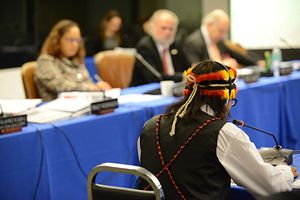José Tendetza’s lifeless body was found floating down the Zamora river in June 2014. Tendetza was a Shuar indigenous leader who fiercely opposed the merciless dispossession of his ancestral territory in southeastern Ecuador, as carried out by the immense Chinese-led mining project “Condor-Mirador.”
This story is by no means isolated. Unfortunately, incidents of this nature are becoming the norm for Ecuador, a novice in the field of transnational-industrialized mining.
China is by far the most important player in Ecuador’s developmental push, and it is strategically replicating this role across the complex political and geographic spectrum of Latin America. As it does so, driven by an insatiable appetite for natural resources, neither Chinese companies nor the Chinese government pay heed to the exigencies of the environment and human rights.
Conjuring the sacred labels of “cooperation” and “progress,” and filling the void left by traditional international lenders, China has paved its way into Ecuador’s natural resources market. Regrettably, some of the country’s richest reserves of oil and minerals are located right under the feet of its indigenous peoples and their (at least for the time being) pristinely preserved ancestral lands.
Both mining projects (such as Panantza-San Carlos and Rio Blanco) and oil ventures (such as the one conducted by the Chinese state-owned Andes Petroleum in Sapara territory), have been beset with serious concerns of social conflict and environmental degradation. For example, in August 2016, the Shuar nation village of Nankints was forcibly evicted from their ancestral territory by the armed forces to make room for the Pananzta-San Carlos copper mine, and as a result, several women and their children suffered from psychological damage and are now homeless.
Despite the growing threat of encroachment by Chinese business and investment, the Ecuadorian government has thus far not only failed to meet its obligations to protect, respect and fulfill the human rights and environmental rights of its people, but they have done quite the opposite. Over the past decade, the government has embarked on a campaign of division and repression of civil society, featuring both the criminalization of protest and the forced closure of a number of NGOs, including those working to protect communities affected by these investments.
Despite the extensive pursuit of domestic judicial remedies, human rights and environmental defenders in Ecuador have consistently found these avenues to be a dead end. As a result, we have turned to uncharted waters: the United Nations. Ecuadorian civil society is only just beginning to familiarize itself with the sophisticated array of human rights mechanisms that the United Nations has to offer, but we know we agree on one thing: that human rights must be a central part of international sustainable development.
And so, over the last couple of years, we have advocated before the UN Human Rights Council, sent communications to UN experts, and actively participated in Ecuador’s Universal Periodic Review. To our surprise, we found that these mechanisms were actually paying attention to what we were saying. They saw serious problems when the government and the corporations saw nothing more than economic opportunity; they saw human rights violations when our politicians and their private associates saw only the bottom line and listened only to shareholder demands.
The open ears and principled attention of these international mechanisms are, as far as we human rights defenders are concerned, a defining feature of the system.
When the UN system, including the Human Rights Council, provides a forum for Ecuadorian indigenous community leaders and environmental activists, those worldviews, concerns and voices gain legitimacy. The mechanisms maintain a fragile and nuanced equilibrium between the rights of participation of both civil society and governments – thereby preventing any government from enjoying a monopoly over the narratives that are presented to the international community.
However, China – not satisfied with the influence it already enjoys at the national level, in our country but also, we suspect, in many others in Latin America – is now targeting those mechanisms. They have put forth a resolution on international cooperation, described as “win-win” or in more traditional diplomatic terms, “mutually beneficial,” at this month’s session of the Human Rights Council. With the focus on state sovereignty and “dialogue and cooperation,” we worry that this may be the first move towards a weakening of the UN human rights institutions; a political strategy bent on softening international standards and eroding this fine balance.
For China, as for many other governments, the result would be to enable it to carry on doing business as usual, freed from the worry that its human rights obligations might be subject to scrutiny or that its victims’ calls for justice might reach the Council’s ears.
For human rights defenders in Ecuador, the result could be disastrous. We came to the UN because it was the only space left for us; it is extremely worrying that, just as we start to see our work at the UN deepen, Chinese influence is slowly encroaching on even this international democratic forum.
If not resisted, crimes committed in the context of international Chinese business operations will remain unchecked, and the bodies of environmental defenders like José Tendetza will continue to fill the holes left behind by the extraction of Ecuador’s mineral and oil resources.
Juan Auz is the co-founder of Terra Mater and executive director of Fundación Pachamama, two NGOs advocating for the rights of Indigenous peoples in the Ecuadorian Amazonian region.

































